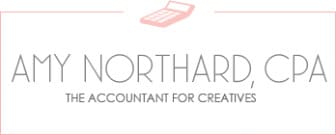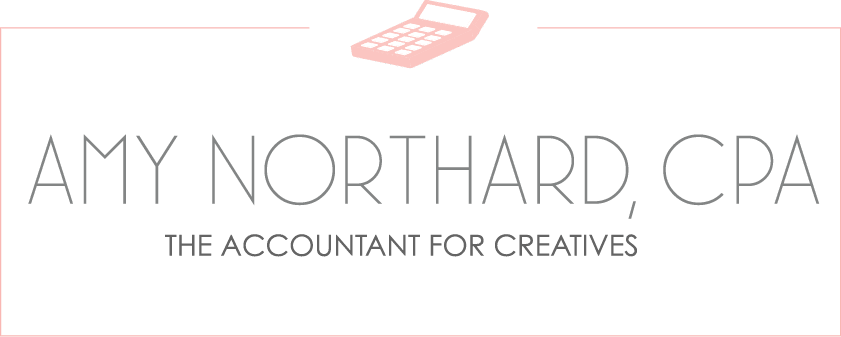Thanks to the internet, I’m able to work with creatives all over the US on their taxes and bookkeeping. About 6 years ago, I started to prepare for making the leap to owning my own business because I couldn’t imagine spending the rest of my life in a windowless cubicle working for clients that didn’t excite me.
Fast forward to today and I’m able to work from home with clients who inspire me every day! For the past few years I’ve had the opportunity to speak at the The Blog Society Conference, and I love meeting and working with this fantastic group of bloggers.
Today I’m going to walk you through a case study I prepared for the The Blog Society Conference.
Meet Sarah
Sarah is blogger who’s on the verge of taking her blog full time. She started her blog a couple years ago because her day job left her feeling like she needed something more. In the beginning, she just thought it would be cool to get some free stuff out of it, but it’s transformed into much more since then. She’s dived into the world of affiliate marketing, sponsored posts, and selling her own digital products. She barely has time outside of work and blogging for anything else and is considering making the leap to full-time blogging. We’re going to walk through some of the things Sarah did to prepare for this big decision.
Sarah started out as a hobby. She had no intention of really bringing in a whole lot of income through the blog and really just wanted a few free things every now and then. As her blog grew in popularity and she began getting paid in more than just merchandise, that was the turning point for her and she began treating her blog like a business instead of a hobby.
Hobby vs. Business – What is the difference?
A hobby is something that casually brings in money, but you don’t really have the intention of making a profit with it.
A business has the goal of eventually making a profit. It’s ok if it’s not making a profit in the first couple years, but after the third year, you’ll need to show a profit on your tax return to prove to the IRS it’s not a hobby.
The big downside to a hobby is that if your expenses are more than your income that year, you can’t deduct more expenses than the total income you brought in.
Sarah set up a single-owner LLC in her state after learning that this structure provides a little more legal protection than staying a sole proprietor (which is the default for any business). Then, she went to the bank to set up a separate business checking account. She took all her business paperwork and it took about 45 minutes to sign all the papers and get it set up at her bank. Now she has a place for all her payments to go in and all her business-related expenses to come out of so when it’s time to do her bookkeeping, she’s not trying to remember all her expenses!
What counts as income for a blogger?
I think we’d all like to only count the actual dollars we’re paid for things like sponsored posts and affiliate sales, but you’ll also want to make sure you’re reporting all the merchandise you receive when the giver has intentions of you promoting it to your audience. If it’s just a thank-you gift and there’s no expectation of you sharing about it with your audience, then you can leave those items out when tallying up your income.
Tax Deductions for Bloggers
Now, let’s get back to Sarah. Her first year, she didn’t really track expenses and just tried to add everything up from memory when it was time to do her taxes. Looking back, she realized she forgot several deductions.
This year, as she starts to prepare to take her blog full time, she wants to make sure she maximizes her blog deductions and figures out what her options are at the end of the year.
We’ll start with some common deductions that Sarah started tracking.
The first couple are pretty obvious. Sarah’s blog design, hosting fees, camera and photographer fees were things she deducted from the very beginning.
Now, the mileage is a different story. Sarah wasn’t tracking miles to blogger meetups, photo shoots with her photographer, or trips to the post office, so she started using MileIQ to track her trips. Every time her car got above 5 mph, it would recognize she was on a “trip” and then ask if it was business or personal. She could make a little note right in the app what the trip was for, and then be done with it. She didn’t have to try and remember everywhere she went and then calculate the miles. By recording an average of 50 miles each month, she got a deduction of over $300.
One of my favorite deductions is the home office deduction. As long as you have a space in your home that you use on a regular basis and only use for blogging (like a desk area), you can deduct a portion of your rent, utilities, internet, insurance and other home-related expenses. Just make sure you save receipts for all these expenses so you can add them up easily at the end of the year.
In Sarah’s case, she has a corner in her bedroom where she keeps her desk, a filing cabinet and her printer. This ends up being about 25 square feet and since her whole apartment is 800 square feet, she can deduct about 3% of her home expenses. This doesn’t sound like a lot, but let’s say you pay $1,000 a month for your rent and utilities. This ads up to a $300 deduction for an expense that you would have anyways.
The last thing on this list is self-employed health insurance. Sarah started looking into this since she doesn’t currently have a spouse’s insurance plan she could move to. It’s not technically a business deduction on the tax return, but she gets to deduct the insurance premiums on the personal part of her tax return, which reduces her overall taxable income and taxes. She went to healthcare.gov to get a quote so she could get a feeling for how much the monthly payments would be.
No one wants to pay more tax than they have to, so Sarah wanted to make sure she was taking advantage of all her year-end options.
My favorite option is contributing to a retirement plan. There are plans called SEP IRAs that are self-employed individuals who want to contribute to a retirement plan. You can contribute up to 25% of your business income and that contribution reduces your taxable income. The nice thing about this is that you have until April 15 of the following year, to contribute for the last year. I was able to lower my taxes by a couple thousand last year by contributing to my SEP IRA.
Sarah decided she would put aside 10% of her profits towards her retirement plan. She transferred this amount over to her savings account every month so it was out of sight and out of mind until she was ready to make the contribution.
The other option for reducing taxes, is to make any necessary purchases for your business before the end of the year. So, if your laptop takes 30 minutes to fully load and it’s about that time to upgrade, consider making the purchase by December 31 so it reduces your current year’s income. The big thing to remember here is that you shouldn’t just spend to spend. It’s tempting to use the reasoning that it will reduce your taxes, but remember that you want to be able to live off this income so it can’t all keep going back into the business.
Can you live off of blogging income?
At this point, Sarah has the basics set up for her blog and feels pretty confident in what she can deduct as far as business expenses.
Now she’s got to really take a look at the numbers before turning in her two-weeks notice to make sure she can comfortably live off of what her blog is bringing in.
Download the worksheet below – you can put in your actual numbers and see how close you are to being able to live off your blog earnings!

